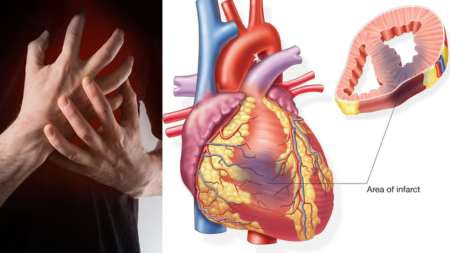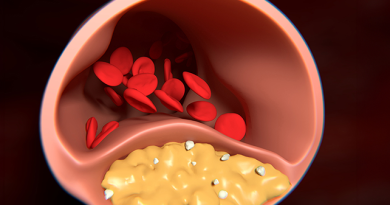Natural Remedies for Myocardial Infarction : Healing the Heart Naturally
Abstract
Myocardial Infarction (MI), commonly known as a heart attack, is a major cause of morbidity and mortality worldwide. While conventional medicine focuses on pharmaceutical interventions, natural remedies have gained attention for their potential in supporting heart health and recovery. Here, we will explore various natural remedies, including diet modifications, herbal treatments, and lifestyle changes, aimed at promoting heart healing and preventing further cardiovascular damage post-MI. The role of antioxidants, anti-inflammatory herbs, and specific nutrients, such as omega-3 fatty acids and coenzyme Q10, in supporting myocardial function will be discussed. This review aims to highlight the complementary benefits of natural remedies in the overall management of myocardial infarction.

Introduction
Myocardial Infarction occurs when there is a blockage in the coronary arteries, preventing blood from reaching the heart muscle. The damage caused can lead to severe long-term complications, including heart failure, arrhythmias, and even death. In addition to medical interventions, patients are increasingly looking toward natural remedies to complement conventional treatments and support their healing process. Natural remedies can potentially aid in reducing inflammation, improving blood circulation, and supporting heart muscle regeneration. This paper delves into various natural approaches, such as dietary modifications, herbal supplements, and lifestyle changes that can be utilized alongside medical care to enhance recovery and prevent future cardiovascular events.
A. Natural Remedies for Myocardial Infarction
1. Garlic (Allium Sativum)
Garlic has been traditionally used for heart health due to its ability to reduce cholesterol levels, lower blood pressure, and prevent blood clots, all of which are important in the prevention of future heart attacks. It contains allicin, which has anti-inflammatory and antioxidant properties. Garlic helps in reducing the risk of atherosclerosis (hardening of the arteries) and improving circulation, which can aid recovery after a heart attack. It also has mild blood-thinning properties, which can reduce the risk of blood clots forming.
2. Ginger (Zingiber Officinale)
Ginger has well-documented anti-inflammatory, antioxidant, and blood-thinning effects. It helps in improving circulation and reducing cholesterol levels, both important factors for heart disease recovery. Ginger’s blood-thinning effect may help prevent blood clots, which can reduce the risk of further blockages in coronary arteries following a heart attack.
3. Hawthorn (Crataegus Spp.)
Hawthorn has long been used to support heart health and is a natural medicine for Myocardial infarction, particularly for improving circulation, reducing blood pressure, and strengthening the heart muscle. Hawthorn contains flavonoids and antioxidants that dilate blood vessels, improving blood flow to the heart and reducing strain on the cardiovascular system. It is believed to help in post-MI recovery by supporting heart function and reducing heart failure symptoms.
4. Cayenne Pepper (Capsicum Annuum)
Cayenne pepper contains capsaicin, which is believed to promote blood circulation and reduce the risk of clot formation. By stimulating blood flow, cayenne pepper helps to reduce the likelihood of blood clots, a major cause of heart attacks. It may also aid in pain relief and reduce inflammation, which can support post-MI recovery, and is natural medicine for Myocardial infarction.
5. Ginkgo Biloba
Ginkgo biloba has been used for improving blood circulation and antioxidant support and is a natural medicine for Myocardial infarction. Ginkgo is believed to increase blood flow to the heart and reduce blood clot formation, which can help in post-MI recovery. It may also help protect the heart from oxidative damage, potentially reducing the risk of another heart event.
6. Flaxseed (Linum Usitatissimum)
Flaxseed is rich in omega-3 fatty acids and lignans, both of which have heart-healthy properties. Flaxseeds help to lower cholesterol levels, reduce blood pressure, and reduce inflammation. These effects can help in managing risk factors for future heart attacks and improve overall heart health following an MI.
7. Coenzyme Q10 (CoQ10)
While not an herb, CoQ10 is a naturally occurring compound found in the body that plays a key role in energy production at the cellular level, especially in the heart muscle. After a myocardial infarction, the heart may struggle to produce sufficient energy. CoQ10 helps improve heart function by supporting cellular energy production, which can aid in the recovery of the heart muscle and improve overall cardiovascular health.
B. Lifestyle Modifications
Certain lifestyle changes are essential for reducing the risk of future heart attacks and improving heart health after an MI. Some points are mentioned below:
1. Regular Physical Activity
Engaging in moderate exercise, such as walking, swimming, or cycling, can help improve cardiovascular fitness and prevent blood clots. However, it’s essential to consult a healthcare professional before beginning any exercise program after a heart attack.
2. Smoking Cessation
Smoking significantly increases the risk of heart disease and can slow down the healing process after a heart attack. Quitting smoking is one of the most important changes you can make for heart health.
3. Stress Reduction
Managing stress through activities like mindfulness, reading, and spending time in nature can help lower blood pressure and reduce the likelihood of further heart issues.
4. Adequate Sleep
Sleep is crucial for recovery and overall health. Ensuring a regular sleep pattern and getting adequate rest can help the body heal and reduce inflammation.
C. Supplements for Heart Health
1. Magnesium
Magnesium is essential for normal heart function. It helps regulate heart rhythms and can reduce the risk of arrhythmias. A deficiency in magnesium has been linked to increased heart disease risk.
2. Vitamin D
A deficiency of vitamin D has been associated with an increased risk of cardiovascular diseases. Ensuring adequate vitamin D levels can help reduce the risk of heart disease and support the body’s healing process after a heart attack.
3. Vitamin B Complex
B vitamins, including B6, B12, and folic acid, play a role in reducing homocysteine levels. Elevated homocysteine is a risk factor for heart disease. B vitamins help promote healthy cholesterol levels and improve heart function.
D. Mind-Body Practices
Stress is a major contributor to cardiovascular diseases, including myocardial infarction. Practicing stress management techniques can have a significant impact on heart health and overall recovery.
1. Meditation and Deep Breathing
Meditation helps lower cortisol levels, reduce stress, and promote relaxation. Deep breathing exercises improve oxygenation and can help the body relax, which is essential for healing after a heart attack.
2. Yoga
Yoga has been shown to reduce stress, improve circulation, and enhance heart health. Certain yoga poses, such as the child’s pose, upward dog, and cat-cow stretches, are beneficial for improving chest and heart circulation.
Conclusion
While myocardial infarction is a serious condition that requires prompt medical attention, incorporating natural remedies can offer significant complementary benefits. Natural interventions such as antioxidant-rich foods, herbal remedies, and heart-healthy lifestyle practices may support the heart’s recovery process and prevent further damage. However, these approaches should always be used in conjunction with traditional medical treatments. More research is needed to establish the effectiveness of these remedies, but they hold promise as part of a holistic approach to cardiovascular health. Patients should always consult their healthcare providers before integrating natural remedies into their treatment plans to ensure their safety and efficacy.




